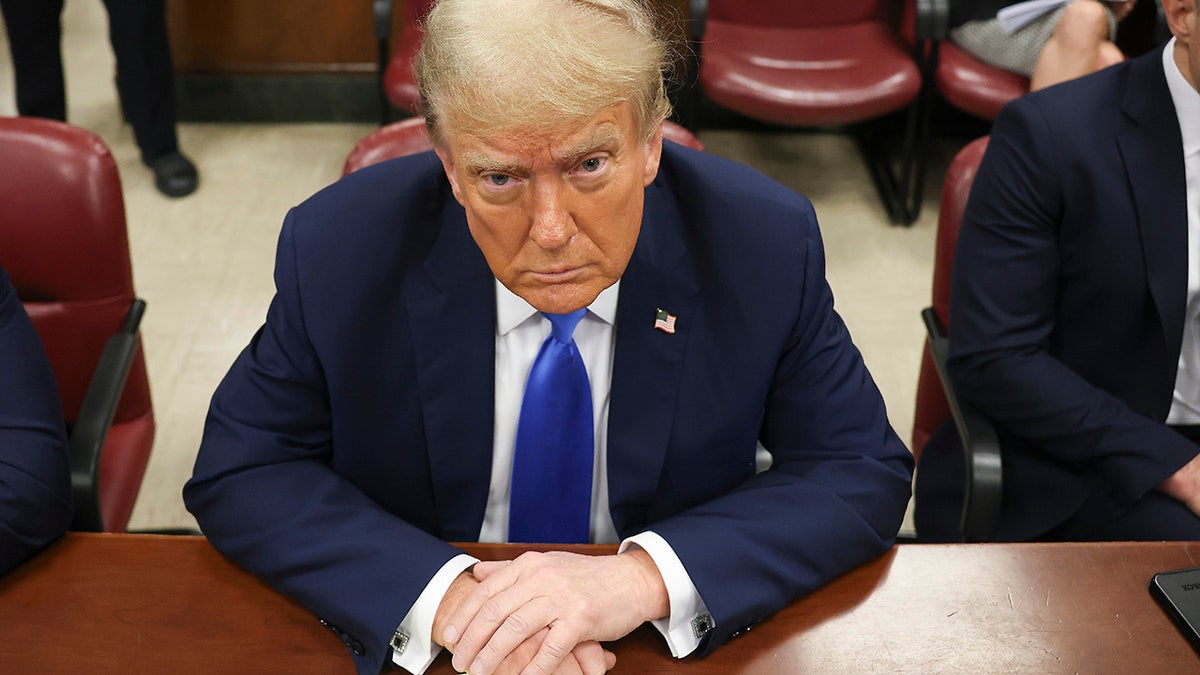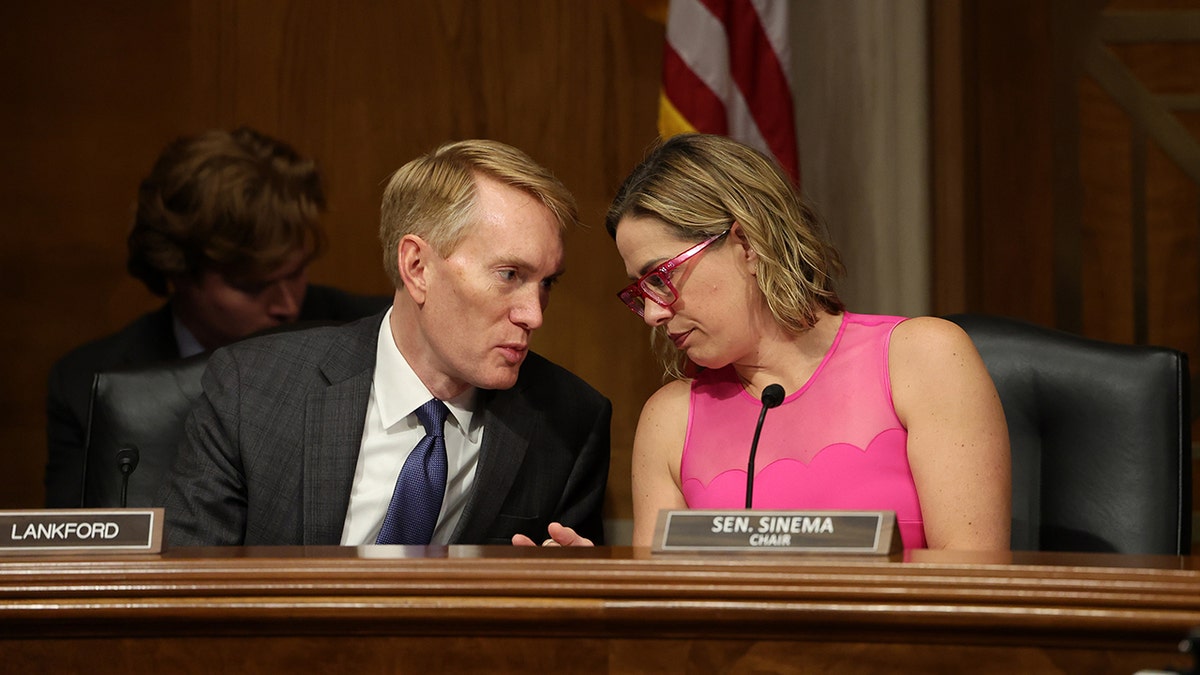Politics
Stefanik hits special counsel Jack Smith with ethics complaint, accuses him of election meddling

House GOP Conference Chair Elise Stefanik, R-N.Y., is filing an ethics complaint against special counsel Jack Smith on Tuesday, accusing him of violating Department of Justice (DOJ) standards and trying to tip the election against former President Trump.
In a letter sent to the DOJ’s Office of Professional Responsibility, Stefanik urged the government watchdog to investigate Smith over accusations of “abusing the resources of the federal government to unlawfully interfere with the 2024 presidential election.”
“Jack Smith’s multiple attempts to rush to trial the federal January 6th case against President Trump violated long-standing, explicit Justice Department policy,” Stefanik wrote.
“Further, Jack Smith’s repeated violations of the United States District Court for the District of Columbia’s stay of proceedings are a lawless breach of trial ethics and lawyerly conduct. Jack Smith’s actions brought disrepute to the Justice Department and the federal government as a whole, and he should face discipline appropriately.”
CLICK HERE FOR THE LATEST FOX NEWS POLLING IN THE 2024 ELECTION
House GOP Conference Chair Elise Stefanik is hitting special counsel Jack Smith with an ethics complaint. (Getty Images)
Smith’s case against Trump, stemming from accusations he tried to overturn the 2020 election, was supposed to go to trial in March but has been stuck in limbo as the Supreme Court weighs the ex-president’s claim he is immune to criminal prosecution for actions taken while in the White House.
The former U.S. attorney and human rights prosecutor petitioned the high court multiple times to reject Trump’s immunity claims and bid to delay his trial, including most recently on April 8.
Stefanik’s complaint accused him of first trying to influence the election in August 2023, when Smith petitioned for a Jan. 2, 2024 trial.
ERIC TRUMP WARNS BRAGG, WILLIS ‘WANT TO TORTURE MY FATHER’ BUT NO ONE ‘IS BELIEVING IT’

Rep. Elise Stefanik accused special counsel Jack Smith of trying to influence the 2024 election against former President Trump. (AP Photo/Yuki Iwamura, Pool)
“There exist approximately thirteen million pages of discovery for President Trump to review, plus thousands of hours of camera footage. Prosecutors bringing a case of this complexity — with so many consequential and novel legal issues to sort out — would normally never seek to bring it to trial within five months,” she argued.
“The only reason to push for such an early trial date was to work to get the case tried before the November election, and the Justice Department Manual clearly forbids Jack Smith from taking any action on that basis.”
She also cited Smith’s petitions with the Supreme Court and used his own comments in court that no American is “above the law” as further argument that he should support an investigation into his conduct.
FANI WILLIS SHOULD FACE GAG ORDER IN TRUMP ELECTION CASE, SAYS LEGAL ANALYST
“If that is true, then he should be open to, and welcome, an ethics investigation into conduct that, on its face, implicates potential violations of DOJ policy and multiple rules of professional conduct,” Stefanik said. “Biden special counsel Jack Smith’s highly unusual and clearly improper attempts to expedite trial, and his blatant violation of District Court orders, evidence his partisan attempt to influence the results of the 2024 presidential election.”
The Supreme Court, which has a 6-3 conservative majority, heard arguments in Trump’s immunity case last week. A final decision is expected in June — with the likelihood of a trial before the presidential election being slim.
Fox News Digital reached out to the DOJ for comment.

Politics
Republicans unite to block White House and Schumer backed 'fake border bill'

Republicans in both chambers of Congress are preparing to band together to block any hope of a Democrat-backed border bill getting to the finish line.
In a letter to senators dated Sunday evening, Senate Majority Leader Chuck Schumer, D-N.Y., revealed his plan to bring an immigration bill to the floor once again after it was rejected primarily by Senate Republicans in February.
“We are hopeful this bipartisan proposal will bring serious-minded Republicans back to the table to advance this bipartisan solution for our border,” he wrote.
DUELING IVF BILLS TAKE CENTER STAGE AS PARTIES BUTT HEADS ON REPRODUCTIVE TECH REGULATION
Senate Majority Leader Chuck Schumer revealed his plan to bring back a Democrat-backed border bill, but Republicans are uniting to block the attempt. (Getty Images)
He noted that he doesn’t expect to get full support from either party, but described the border measure negotiated by Sens. Chris Murphy, D-Conn., Kyrsten Sinema, I-Ariz., and James Lankford, R-Okla., as “a tough, serious-minded, and – critically, bipartisan – proposal to secure our border.”
The White House promptly backed Schumer’s plan, with press secretary Karine Jean-Pierre calling on “every senator to put partisan politics aside and vote to secure the border.”
BALANCE OF POWER: VULNERABLE DEMS LOOK TO DIFFERENTIATE THEMSELVES FROM UNPOPULAR BIDEN

Sens. Lankford and Sinema were designated negotiators for the border bill. (Kevin Dietsch/Getty Images)
Republicans were quick to push back on the majority leader’s characterization of the bill. “The fake border bill will fail, again, because it does nothing to seriously secure the border – just cement outrageous levels of illegal immigration,” wrote Sen. Mike Lee, R-Utah on X, the platform formerly known as Twitter.
“Ironically, some Democrats will vote against it, because even pretending to limit illegal immigration is a step too far for them,” he added.
The bill failed a test vote in February, by a vote of 49-50, short of the 60 votes needed to proceed.
Sen. Rick Scott, R-Fla., slammed Democrats reviving the bill as “political theatre.”
“He thinks this vote will make you think Republicans are to blame for Biden’s border crisis,” he wrote on X.
Sen. Eric Schmitt, R-Mo., similarly labeled Schumer’s plan as “kabuki theater.”
Republicans were quick to reject the negotiated legislation after hearing some of the elements and seeing the bill text, which many described as weak and even counterproductive.
SEN DURBIN DEMANDS JUSTICE ALITO RECUSE FROM TRUMP CASES AFTER FLYING UPSIDE-DOWN US FLAG

Immigration has become a top issue for voters going into the election. (James Breeden for New York Post/Mega)
Lankford, who notably helped craft the bill, denounced last week the then-speculation of Schumer bringing the measure back to the floor. “Listen, if we’re going to solve the border issues, it’s not going to by doing competing messaging bills. If we’re going to solve this, let’s sit down like adults and let’s figure out how we’re going to actually resolve this together,” he said in floor remarks.
Lankford was one of only four in his party to vote in favor of moving forward with the negotiated bill in February. It’s unclear if he would support it again.
His fellow negotiator, Murphy, has led the charge to reconsider the bill. “Republicans don’t care about fixing the border,” he wrote Monday on X. “They want the border a mess because it helps them politically.”
It’s unlikely that the measure will be able to get 60 votes in order to move forward, spelling doom for the bill a second time. But if it were to get past the upper chamber, House Republican leadership made it clear it would be “dead on arrival” in its lower counterpart.
AOC RIPS FETTERMAN FOR COMPARING HOUSE TO ‘JERRY SPRINGER’ SHOW: ‘I STAND UP TO BULLIES’

House leadership preemptively warned that the bill would be “dead on arrival.” (Getty Images)
In a statement, Speaker Mike Johnson, R-La., Majority Leader Steve Scalise, R-La., Majority Whip Tom Emmer, R-Minn., and Republican conference Chairwoman Elise Stefanik, R-N.Y., said, “Leader Schumer is trying give his vulnerable members cover by bringing a vote on a bill which has already failed once in the Senate because it would actually codify many of the disastrous Biden open border policies that created this crisis in the first place.”
They further highlighted several tougher illegal immigration and border bills that have been passed by the Republican-majority House. “If Senate Democrats were actually serious about solving the problem and ending the border catastrophe, they would bring up H.R. 2 and pass it this week,” they said.
H.R.2 includes nearly all Republican priorities and has been disregarded by Democratic leaders. Schumer previously remarked that the bill was full of “hard-right border policies” and said it would never be able to pass through Congress.
Politics
Taiwan's new president calls for peace amid tenuous relations with China

In his first speech as president of Taiwan, Lai Ching-te emphasized preserving peace amid rising tensions with China and criticism that he could provoke military conflict.
At his inauguration Monday, Lai called for China to help maintain peace and halt military and political intimidation directed at the self-ruled island. Chinese President Xi Jinping considers Taiwan a part of China’s territory and has vowed to pursue its unification with the mainland, by force if necessary.
Denounced by China as a “separatist” who advocates for Taiwan’s independence, Lai stressed his dedication to preserving the status quo without ceding ground to Beijing’s claims of sovereignty.
“As we pursue the ideal of peace, we must not harbor any delusions,” he said after his being sworn in. “So long as China refuses to renounce the use of force against Taiwan, all of us in Taiwan ought to understand, that even if we accept the entirety of China’s position and give up our sovereignty, China’s ambition to annex Taiwan will not simply disappear.”
The Chinese government’s Taiwan Affairs Office posted a statement Monday after Lai’s speech that he “stubbornly maintains a separatist stance of ‘Taiwan independence’” and accused him of undermining peace and stability in the region.
China also sanctioned three U.S. defense contractors Monday for providing weapons to Taiwan.
China has ramped up military activity around the island of 23 million in the last few years. It has also cut preferential tariffs and trade on certain goods from Taiwan, in what officials have criticized as economic coercion.
Daniel Russel, vice president for international security and diplomacy at the Asia Society Policy Institute, said that while Lai’s remarks may reassure some foreign governments that he will not pursue formal independence for Taiwan, it did little to placate leaders in China.
“There is virtually nothing that Lai could have said, short of ‘unconditional surrender,’ that would satisfy Beijing,” Russel said.
Lai’s election marks the first time that one political party in Taiwan has ruled for more than two presidential terms. Under his predecessor, Tsai Ing-wen, the island democracy bolstered defense spending and strengthened ties with the U.S., which recently passed a bill to provide $8 billion in aid to Taiwan.
Wen-ti Sung, a political scientist at Australia National University who specializes in cross-strait relations, said Lai’s inauguration speech largely telegraphed his plan to continue the same policies as Tsai, whom Beijing cut contact with when she took office eight years ago.
“He’s trying to project an image of pragmatism and predictability,” Sung said.
Lai, a 64-year-old former doctor, won election in January with 40% of the vote and faces a divided parliament. In his remarks, he addressed the need to work with opposition lawmakers as well as domestic issues such as low wage growth, energy security and affordable housing.
“This new structure is a result of the people’s choice,” he said. “Looking at it with a different frame of mind, a lack of absolute majority means that the ruling and opposition parties are now all able to share their ideas, and that we will be undertaking the nation’s challenges as one.”
He also proposed restarting tourism and student exchanges with China.
“Cross-strait relations will remain fragile and mired in distrust,” said Amanda Hsiao, senior China analyst at International Crisis Group. “But the resumption of tourism and student exchange can help improve the atmosphere.”
There was sparse coverage of the inauguration in Chinese state or social media. On Weibo, China’s X-like social media platform, searches for Lai and Tsai appeared to be blocked. The Global Times, the Communist Party tabloid, called Lai a secessionist in an article Sunday and warned that he may become emboldened in taking steps toward independence during his time in office.
“In the long term, the state of cross-Straits relations will not be optimistic,” the article said.
Special correspondent Huiyee Chiew in Taipei contributed to this report.
Politics
Progressive and establishment Democrats compete for US House seats in Oregon primaries

Two Democratic primaries for U.S. House seats in Oregon could help reveal whether the party’s voters are leaning more toward progressive or establishment factions in a critical presidential election year.
The state’s 3rd Congressional District, which includes much of liberal Portland, will have its first open Democratic primary since 1996 with the retirement of U.S. Rep. Earl Blumenauer.
Two candidates with similar platforms are leading in fundraising: Maxine Dexter, a doctor and two-term state representative, and Susheela Jayapal, a former county commissioner endorsed by U.S. Sen. Bernie Sanders of Vermont. Jayapal is the sister of U.S. Rep. Pramila Jayapal from Washington state, who chairs the Congressional Progressive Caucus.
REPUBLICAN AIMING TO FLIP KEY SENATE SEAT IN DARK BLUE STATE GETS PRAISE FROM THESE TOP DEMS
While outside money and claims of Republican meddling have marked the race, national Democrats can safely bet on holding the solidly blue district as they seek to overturn the GOP’s thin majority in the House. Party leaders are more keenly eyeing the state’s 5th Congressional District, which will likely be home to one of the most competitive races in the country.
“This is one of the big swing districts nationally that both parties are really looking for to hold on to, or recapture, the House,” Ben Gaskins, associate professor of political science at Lewis & Clark College, said of Oregon’s 5th District. “I think that the big question is, to what degree are the Democratic voters really going to prioritize electability?”
Eager to reclaim the 5th District after it was flipped by the GOP in 2022 for the first time in roughly 25 years, congressional Democrats are supporting Janelle Bynum. They see her as having a better chance of winning in November than Jamie McLeod-Skinner, the progressive who in the 2022 midterm primary ousted the Democratic moderate who long held the seat and then lost to Republican Lori Chavez-DeRemer in the general election, Gaskins said.
A sign is displayed at the Clackamas County Democratic party building in Oregon’s 5th Congressional District, on May 17, 2024, in Oregon City, Oregon. Two Democratic primaries for U.S. House seats in Oregon could help reveal whether the party’s voters are leaning more toward progressive or establishment factions. (AP Photo/Jenny Kane)
“I think many Democrats are going to hold that against her,” he said of McLeod-Skinner’s narrow 2022 defeat. “She had a chance. She lost.”
Key Democrats have endorsed Bynum, including Oregon Gov. Tina Kotek and three of the state’s U.S. representatives.
The U.S. House Democrats’ fundraising arm, the Democratic Congressional Campaign Committee, named Bynum to its “Red to Blue” program, noting Bynum previously defeated Chavez-DeRemer in legislative elections. The program provides organizational and financial support to Democrats running to flip GOP districts.
Meanwhile, a late flood of spending from a political action committee on behalf of McLeod-Skinner has raised questions about whether Republicans are trying to tilt the scales in favor of a more progressive candidate whom they see as easier to beat in a general election.
Rep. Richard Hudson, chairman of the campaign arm for House Republicans, said he had no knowledge of Republicans getting involved in the Democratic primary.
The boundaries of the 5th District were significantly redrawn following the 2020 census. It encompasses disparate regions spanning metro Portland and its wealthy and working-class suburbs, as well as rural agricultural and mountain communities and the fast-growing central Oregon city of Bend on the other side of the Cascade Range.
“I think candidates are trying to figure out exactly what the secret sauce is for this district, because there are just so many different interests here,” said Chris Koski, a political science professor at Reed College in Portland.
McLeod-Skinner, an attorney who has served in multiple local governments, lives in central Oregon with her wife and pitches herself as someone who can bring together rural and urban voters. Her campaign website says that while attending high school in southern Oregon, she helped support her family “by mucking horse stalls and bucking hay.” This is her third time running for Congress.
Bynum, from Washington, D.C., was elected to the Oregon House in 2016, representing the suburbs southeast of Portland. She has served on the chamber’s small business committee and is the owner of four McDonald’s franchises.
Both women studied engineering and have similar policy stances. They support abortion protections, lowering health care costs and tackling climate change.
As of late Friday, Bynum had outraised McLeod-Skinner by about $385,000. But much of the money in the race has been outside spending from super PACs. Such groups can’t contribute directly to campaigns, but can spend unlimited amounts of money on advertising for or against candidates.
A PAC called Mainstream Democrats has spent nearly $380,000 in support of Bynum and the same amount opposing McLeod-Skinner, federal campaign finance filings show.
Though both candidates have engineering degrees, the 314 Action Fund, which says it focuses on electing Democrats with science backgrounds to Congress, has spent more than $470,000 on ads and mailers in support of Bynum.
The super PAC also has invested heavily in Oregon’s 3rd District, spending nearly $2.2 million on ads supporting Dexter, a pulmonologist.
Another PAC, the recently created Voters for Responsive Government, has spent $2.4 million opposing Jayapal.
Jayapal and McLeod-Skinner have criticized what they call “dark money” flowing into the races.
Jayapal has suggested the 314 Action Fund’s spending in the 3rd District is linked to “MAGA Republican mega-donors.” Her campaign manager, Andrea Cervone, said in an email there has been “a growing trend across the country of billionaires and millionaires with a history of giving to MAGA Republicans” funneling money into Democratic primaries, but didn’t provide a specific example of how the group is linked to such donors.
Cervone said the 314 Action Fund raised and spent much of its money in April, meaning the group won’t have to disclose its donors until the next federal filing deadline on May 20, the day before the election.
314 Action Fund’s president Shaughnessy Naughton said in an emailed statement that the group she founded has spent millions of dollars to “defeat MAGA Republicans.”
“It is beyond the pale and an act of desperation for Susheela Jayapal’s campaign to make these false charges,” she said.
In a statement this month in response to the comments about “dark money,” Dexter condemned the outside spending on ads targeting her opponent: “I do not condone or support these negative ads in any way and remain committed to a positive conversation.”
Dexter’s campaign also has been boosted recently by direct contributions from individuals. She reported raising more than $218,000 on a single day earlier this month, including from donors who previously donated to Republican candidates and the American Israel Public Affairs Committee, or AIPAC, federal filings show.
Jayapal touts herself as being the first candidate in the race to call for a cease-fire in Gaza.
With the Democratic frontrunners in each race largely sharing policy platforms, voters may have to choose based on style. Dexter and Bynum highlight their legislative records, while Jayapal and McLeod-Skinner lean into their progressive endorsements, Gaskins said.
“That pragmatism versus idealism divide in the Democratic electorate, I think, will be the biggest way to distinguish them,” Gaskins said. “Is it about taking the boldest progressive stance on the issues or emphasizing being able to get things done?”
-

 News1 week ago
News1 week agoSkeletal remains found almost 40 years ago identified as woman who disappeared in 1968
-

 Movie Reviews1 week ago
Movie Reviews1 week ago“Kingdom of the Planet of the Apes”: Disney's New Kingdom is Far From Magical (Movie Review)
-

 World1 week ago
World1 week agoIndia Lok Sabha election 2024 Phase 4: Who votes and what’s at stake?
-

 World1 week ago
World1 week agoUkraine’s military chief admits ‘difficult situation’ in Kharkiv region
-

 Politics1 week ago
Politics1 week agoTales from the trail: The blue states Trump eyes to turn red in November
-

 World1 week ago
World1 week agoBorrell: Spain, Ireland and others could recognise Palestine on 21 May
-

 World1 week ago
World1 week agoCatalans vote in crucial regional election for the separatist movement
-

 Politics1 week ago
Politics1 week agoNorth Dakota gov, former presidential candidate Doug Burgum front and center at Trump New Jersey rally












